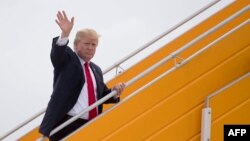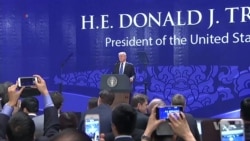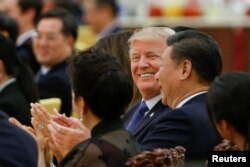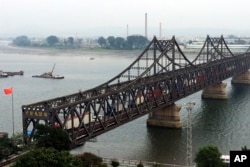U.S. President Donald Trump is in Vietnam for a second day of meetings with Asian economic leaders after championing a strong “America first” agenda in an address to regional business leaders.
Trump attended the annual Asia-Pacific Economic Cooperation summit in Danang on Saturday, one of several summits he is planning to attend during a five-country Asian tour. Later Saturday, he left for Hanoi, the capital, to attend a state banquet before formal meetings Sunday with Vietnam's president and prime minister.
The U.S. president attended the summit’s welcome event and gala dinner Friday evening, where he was seen shaking hands and exchanging a few words with Russian President Vladimir Putin. The White House has said the two leaders may have a brief chat during the summit but are not planning to hold substantive talks.
Following the summit, Trump will travel Saturday evening to Vietnam’s capital, Hanoi, for a state banquet.
WATCH: Leaders of US and China Offer Asia Business Leaders Divergent Paths
On Friday, Trump and his Chinese counterpart, President Xi Jinping, offered starkly contrasting views of the direction for trade in Asia in separate speeches to regional business leaders.
Trump told the APEC CEO Summit that he is willing to make bilateral trade agreements with any country in the Indo-Pacific region, but he firmly rejected multinational deals such as the 12-nation Trans-Pacific Partnership, which was abandoned in the first days of his administration.
“I will make bilateral trade agreements with any Indo-Pacific nation that wants to be our partner and that will abide by the principles of fair and reciprocal trade,” Trump said. “What we will no longer do is enter into large agreements that tie our hands, surrender our sovereignty, and make meaningful enforcement practically impossible.”
Trump president said that in the past when the U.S. “lowered market barriers, other countries didn’t open their markets to us.”
From now on, however, Trump warned that the United States will, “expect that our partners will faithfully follow the rules. We expect that markets will be open to an equal degree on both sides and that private investment, not government planners, will direct investment.”
But making that happen is something that is easier said than done.
China has shown that it has no intention of playing by the rules, said Fraser Howie, co-author of the book Red Capitalism: The Fragile Financial Foundation of China’s Extraordinary Rise.
“China has been in WTO terms simply much sharper and smarter than the Americans,” Howie said. “While the Americans went in with good faith thinking the Chinese would change and whatever, the Chinese never had any intention of changing.”
Howie added that trade and access issues are difficult and sophisticated, and so far Trump has a poor track record when it comes to follow through — be it his travel ban, the wall for the U.S.-Mexico border, health care reform or tax policy.
“Yes, you’re going to get tough on them, but how do get tough without penalizing them,” he said, adding, “how can China be penalized when Xi Jinping is your best mate? It doesn’t make any sense.”
Xi embraces multilateral deals
President Xi, whose country’s rise has been driven greatly by large-scale government planning, immediately followed Trump on the stage in Danang.
Xi embraced the multilateral concept, in particular calling for support for a Free Trade Area of the Asia-Pacific (FTAAP), which would harmonize regional and bilateral economic pacts.
China was left out of the TPP, which was led by the United States and Japan and was meant in great part as a bulwark against China’s strategic ambitions.
Xi also termed globalization an irreversible trend, but said the world must work to make it more balanced and inclusive.
The speeches came just hours after Trump left China where he and Xi met several times Wednesday and Thursday.
Trump softens tone in Beijing
In Beijing on Thursday, the U.S. president had struck a markedly softer tone than in the past on touchy subjects such as North Korea and trade saying he had an “incredibly warm” feeling for Xi.
Trump noted the U.S. must change its policy.
“It’s too bad that past administrations allowed it go get so far out of kilter,” Trump said. “But we’ll make it fair, and it will be tremendous for both of us.”
The Chinese leader said Beijing’s relationship with Washington “now stands at a new starting point” and vowed to “enhance communication and cooperation on the nuclear issues on the Korean Peninsula” and other issues.
“For China and the United States, cooperation is the only viable choice, and win-win cooperation can take us to a better future,” the Chinese president said.
North Korea
Much of Trump’s Asia tour has focused on North Korea, which is developing a nuclear and missile program in violation of U.N. Security Council resolutions.
Trump pressed Xi privately on the North Korea nuclear issue, according to Trump administration officials. According to Secretary of State Rex Tillerson, Trump told Xi, “You’re a strong man, I’m sure you can solve this for me.”
Speaking in Beijing, Tillerson noted “there is no disagreement on North Korea” between the United States and China. The diplomat pointed out that the Chinese have been clear and unequivocal over two days of talks that they will not accept a North Korea with nuclear weapons.
“There’s no space between both of our objectives,” Tillerson said. “We have our own views of the tactics, the timing and how far to go with pressure and that’s what we spend a lot of time exchanging views on.”
VOA's Bill Ide in Beijing contributed to this report.












